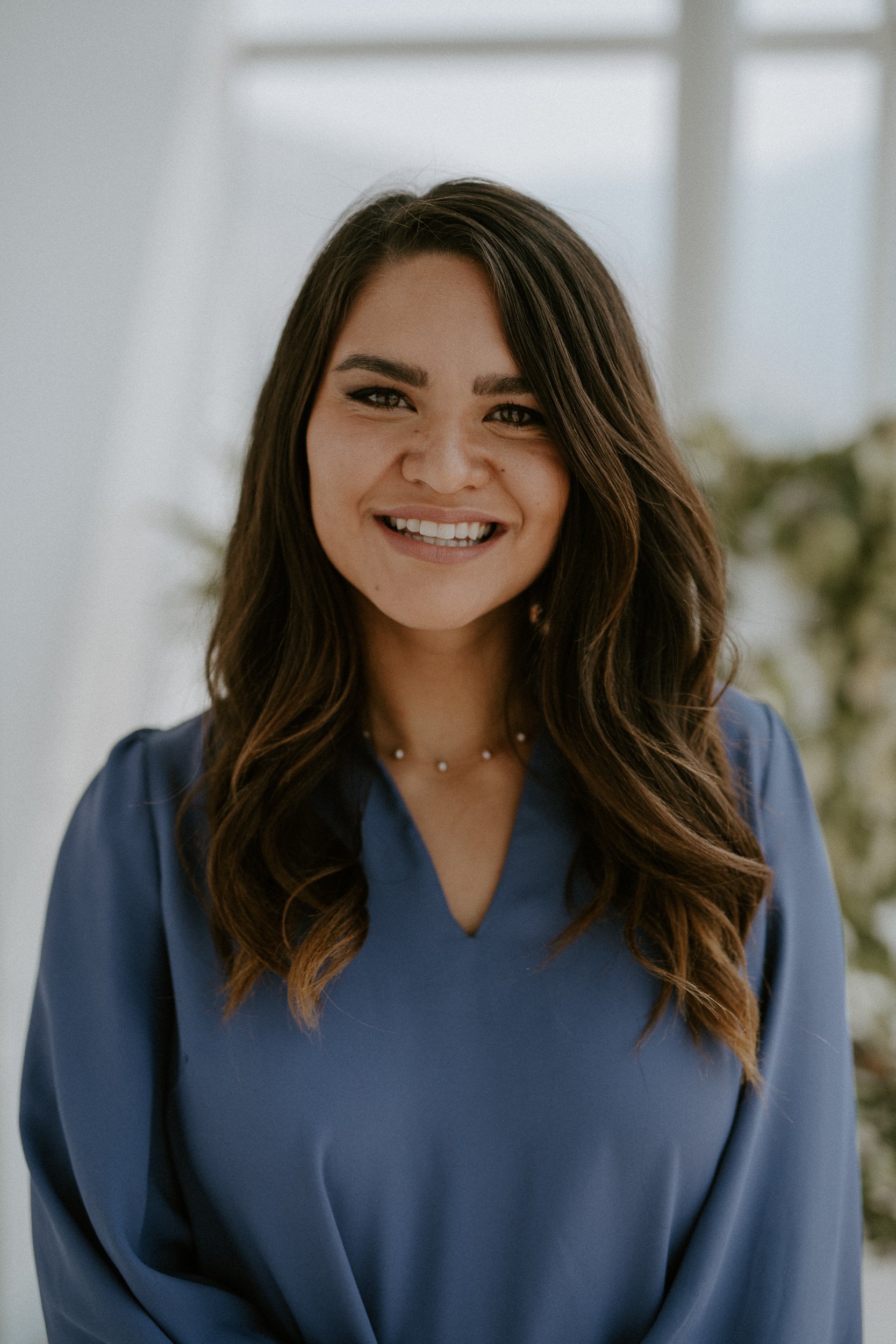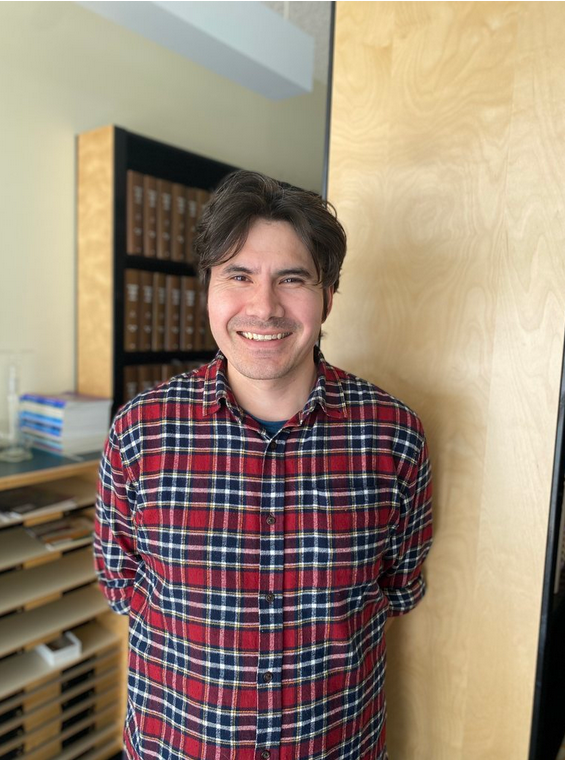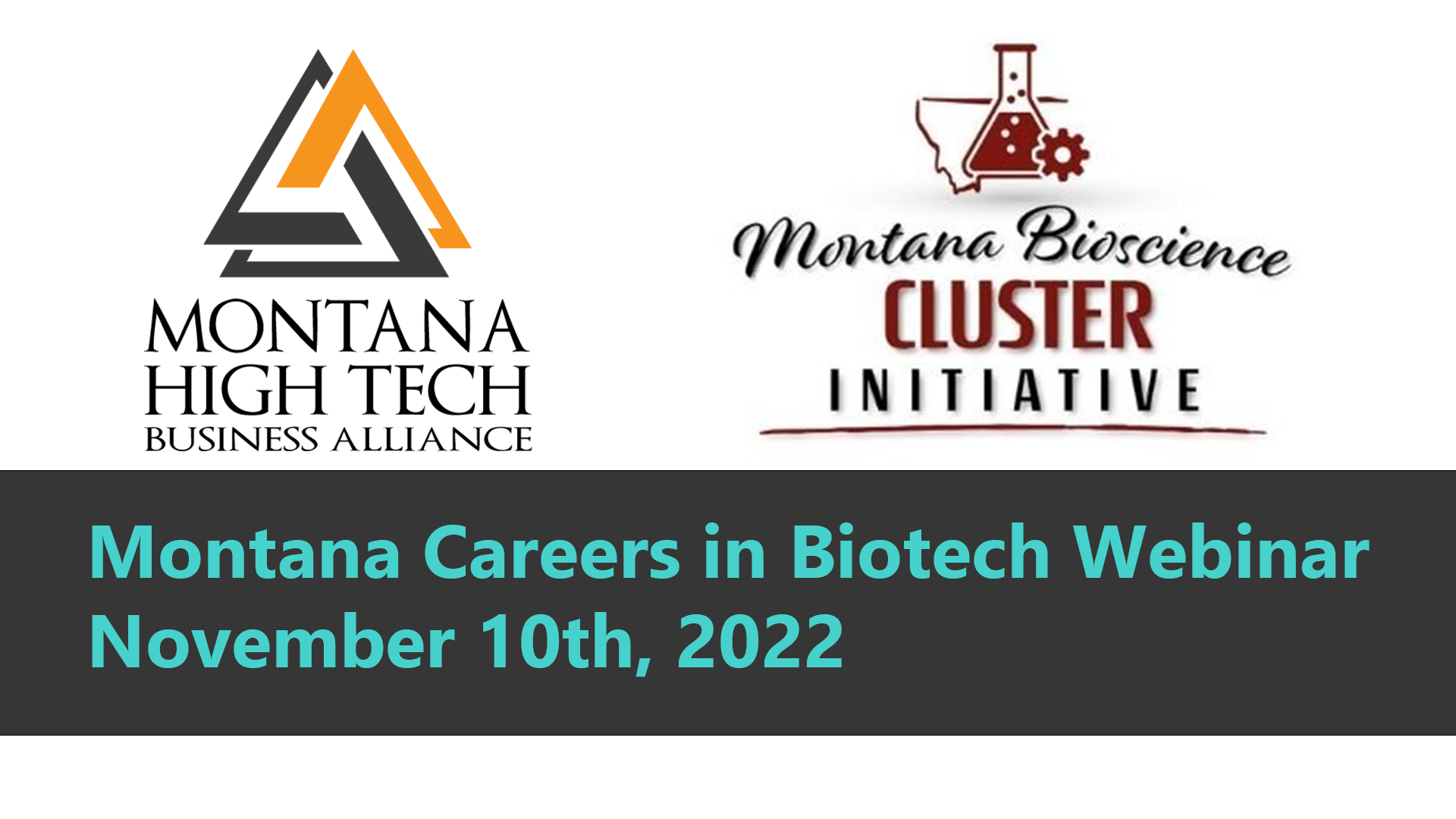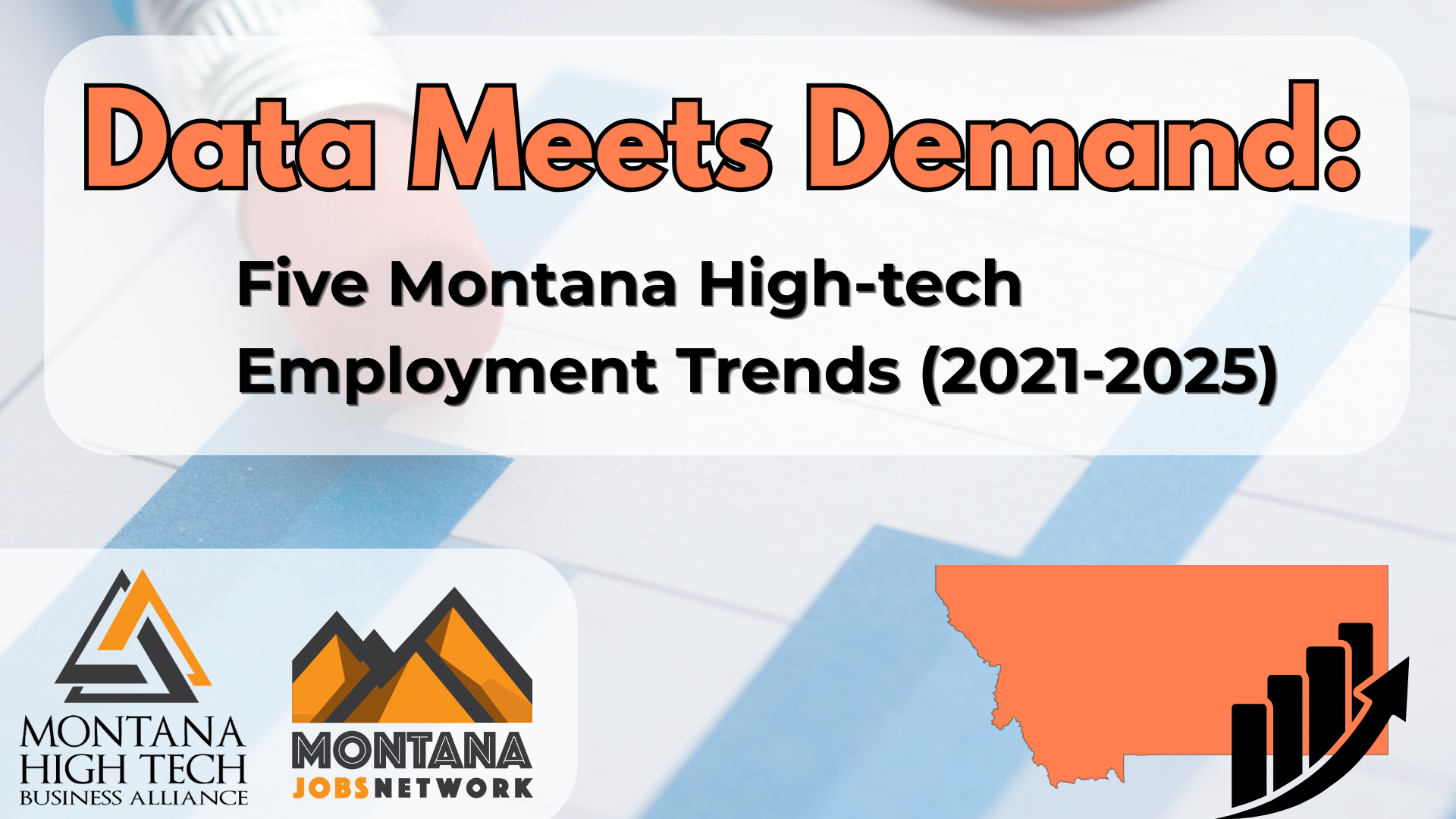Three Montana Innovators Share Their Tips for Launching a Career in Montana’s Biotech Industry
On Thursday, November 10, 2022, the Montana High Tech Business Alliance and Montana Bioscience Cluster Initiative partnered for a webinar featuring Montana careers in Biotech. Guest speakers included Karen Brown, Founder and CEO of KLEO Research in Missoula; Moses Leavens, Protein Biochemist at McLaughlin Research Institute in Great Falls; and Andreas Scherer, President and CEO of Golden Helix in Bozeman. Photo via Artem Podrez for Pexels.
December 28, 2022
By Melissa Paulsen
To better understand the popular field of biotech and how you can excel in an exciting biotech career of your own, the Montana High Tech Business Alliance co-hosted a webinar with the Montana Bioscience Cluster Initiative to interview three Montana innovators who are working at the intersection of the biosciences and technology. Panelists included:
Karen Brown, PharmD, Founder and CEO of KLEO Research in Missoula. KLEO supports clinical research to improve healthcare for underserved populations.
Moses Leavens, PhD, Protein Biochemist at McLaughlin Research Institute in Great Falls. McLaughlin Research Institute develops biomarkers to diagnose and treat dementia.
Andreas Scherer, PhD, President and CEO of Golden Helix Inc in Bozeman. Golden Helix builds software to analyze genetic data for cancer, germline diseases, and prenatal screening.
In this interview, Karen, Moses, and Andreas discuss their career stories, what a typical day looks like for them in the biotech industry of Montana, and the skills students can hone to launch a successful career in biotech. Questions and responses have been edited for length and clarity.
From left to right: Karen Brown, Moses Leavens, and Andreas Scherer.
Could you please start by telling us the story of your own career - where you are from, your education, and your career path up to now?
Karen Brown: I grew up in central Montana [and] worked on a farm right outside of Great Falls. Growing up, I had a strong interest in science and [participated in] science fairs, robotics, and [every science] opportunity I had at my fingertips. My mom was a nurse, so I had some ability to see into healthcare, and I took those influences and combined them and [went] to pharmacy school in Missoula. I earned my PharmD in 2020 and I completed my postdoc in pharmacogenomics soon afterwards. I launched KLEO as a consulting firm for medical device and biotech companies.
Moses Leavens: I was born and raised in Great Falls. To be honest, I didn't know what I wanted to do out of high school. Some of my family members had some infectious diseases [and] that got me interested in viruses and the field of virology and immunology. I went to MSU Great Falls and took a bunch of general education courses, and that's when I got hooked on math. I ended up getting my bachelor's degree from University of Providence in Great Falls and worked for a little bit in environmental health [before] I realized that wasn't really something I wanted to pursue as a career. I missed doing research, so I applied to the [University of Montana’s] Biochemistry and Biophysics program. I finished my degree in 2019. I did a postdoc at NIAID, which is part of the NIH Rocky Mountain labs, and I was there for three years [before I] got hired at McLaughlin earlier this year.
Andreas Scherer: I was born and raised in Germany. As a kid, math was always [an] easy [subject] for me, and I [became] interested in programming. When I was 15, I started programming basic languages like Pascal and with C. While I went to college, I started a computer science degree in combination with medicine in Germany and my master thesis was on DNA sequence analysis. When I finished [my degree], there were no jobs [in DNA sequencing], so I accepted a different PhD job focused on AI (artificial intelligence) and neural networks and finished that in 1994. I [started] at HP (Hewlett-Packard). I [oversaw] their internet security as part of my work in science, [and] I had some exposure to internet technologies which helped me advance. I then took over professional services for Netscape in Europe and then became Global Vice President for professional services in the United States. Over the last 20 years of my career, I managed private companies. 10 years ago, I invested in and took over Golden Helix. At that time, the company was very much research focused and I changed the strategy to move the company into the clinical space.
Could you give us an overview of how your organization got started and what the company does?
Karen: I founded KLEO Research as a contract research organization. I was finishing pharmacy school and I decided that traditional pharmacists’ roles really weren't going to be for me. I leaned into some of the experiences that I had doing research and into the network that I had at the time, and I started consulting in the healthcare space. Having that clinician background, I really wanted to launch KLEO to become a disruptor in the medical industry. KLEO is disruptive because it's nimble [and] uses high quality outsourced labor. Our competitors in the contract research organization space are typically large companies that have massive amounts of overhead and bureaucracy, and they really can't support the small organizations that are trying to bring health innovation to market. [KLEO] provides that clinical affairs piece or the regulatory reimbursement or market access [and] the medical writing strategy and support to these [small] companies.
Moses: McLaughlin Research Institute in Great Falls is a nonprofit research institute that's been around since 1954. The research focus has changed over the years. Initially, it was started by a physician [studying] tissue transplantation. Over the past few decades, that [research] changed into immunology research and for the past 25 years McLaughlin has specifically studied neurodegeneration, [such as] Parkinson's disease, Alzheimer's disease, [or] diseases of the brain where different sets of neurons are killed. One of the main things my lab does is use human tissue for certain neurodegenerative diseases because that tissue has some information in there that we are trying to use as a biomarker. Specifically misfolded proteins [that] we call protein seeds [are] abundant in all these different [neurodegenerative] diseases. We use technology to amplify these protein seeds and try to get the assays sensitive and specific for that disease.
Andreas: Golden Helix develops diagnostic pipelines based on NGS (next generation sequencing) technology. The most important use case is cancer. Cancer is a disease of the genome. What we do is sequence the tumor, either [via] solid biopsy or liquid biopsy, then based on [the biopsy] we can find driver mutations, cross reference all the FDA approved drugs, and then create a clinical report. We’re addressing how to do this very well and efficiently and how we can scale. We have a global customer base, some of our customers having thousands of samples a month. Our [diagnostic] pipelines can also be used to analyze germline diseases and prenatal screening.
What is a typical day like for you?
Andreas: I try to talk as much as possible with customers. [My day] typically starts with calls with European clients in the morning. [In any given] week, I touch base with every aspect of the company. I have Monday morning sales and marketing operations meetings. [Throughout] the week, there are specialized meetings [across the teams] so that we have all our projects lined up. [There are] measurement meetings on Thursdays and then on Fridays I talk with the engineering and field application team. If I’m not with customers, I spend time focusing on business development, getting company evaluations started, tax preparation, or [speak to] outside consultants that help us sharpen our processes and approaches to business.
Moses: A lot of [my day] is spent writing whether it's manuscript writing or grant writing. I would also say a good chunk of the day is spent troubleshooting. When you're running your own lab, there's always issues that come up. Whether it's issues with protein purification, growing bacteria, or issues with an experiment, I help troubleshoot and steer the research back into a good progressive direction. A good amount of time is [also] spent thinking of ideas [and] reading [research] papers. I spend a lot of time reading and I'm always looking for connections. I'm trying to figure out common pathways or mechanisms that are involved in both disease A and disease B, and then that gets my brain thinking about maybe a new grant proposal idea as I gather preliminary data.
Karen: I’m back and forth between work and being a mom, but workwise, I’ve really built a process for myself [and] I call it an accountability workflow. [My accountability workflow] gets me to my desk in the morning at a certain time and gets me through my emails by the end of the day. Other than that, [my workday] is a lot of talking to people on the phone, a lot of emails, and a lot of contracts and proposals.
What is required to have a career like yours? What education, internships, experience, etc. would someone need to be qualified for the work you do?
Andreas: On the engineering side, we prefer full stack engineers, which means they have competency in developing UIs (user interfaces), but also have a full understanding of data structures and [they] can build algorithms. We prefer people [who understand C programming because] it's still relevant, and then Typescript and so on.
[For] the field application scientists, it honestly doesn't matter if [candidates] have a master's or a bachelor’s [degree], or if they're self-taught. We have people with masters [degrees] and PhDs for the most part, but that is just how things evolved. Even though I have a PhD, I would rather have people with strong programming skills than someone just with a theoretical background. [For] the field application scientist roles, we primarily have people with PhDs in biology who have a very good understanding of genomics natively [and] strong communication skills.
On the sales side, [having a] working knowledge of genetics is important. Strong prospecting capabilities, the ability to handle dozens of transactions in parallel, and being a good communicator are also important. In other companies, I have seen people coming from science with PhDs and being super successful in sales. Similarly for marketing, [having a] working knowledge of genetics, and strong technical competency in CRM (customer relationship management), web analytics, and marketing automation are important. Marketing has become super technical. In operations, I'm looking for people who are very good at financial modeling, forecasting, [and] also QuickBooks, tax preparation, and so on. We have genetics training for nonscientists that everybody goes through so they can relate better to their colleagues. I find this [training] very important so that everybody understands what [our company offers and] why we have products in certain segments of the market.
Karen: I work with a wide range of education, [but], the majority of [candidates] have PhD or master’s degrees. The people that I love to work with are great communicators. They're open, nimble, ready to innovate, can manage their time well, and they hold themselves accountable. In the clinical research base, the majority of people who get into clinical research really kind of fall into it. They don't seem to follow one career path, so I work with fantastic engineers, fantastic nurses, or fantastic people who didn't even think about [the] sciences but learned how to consent patients or are talented in that way. [There is] a wide range of people at our company.
Moses: At McLaughlin Research Institute a large part of the institute is our animal resource facility or animal resource centers (ARCs). We house [thousands of] mice and at least a third [of employees] work in the ARC as cage wash technicians or doing mouse behavioral tests. McLaughlin has a neurodegeneration research focus, so our mice model these diseases. For diseases like ALS, you can sit a mouse on a rod and measure how long they stay. When mice have ALS, they fall right off because of muscular disease.
In the research laboratories, we have lab technicians, research assistants, postdocs, and research faculty. The lab techs and the research assistants all have a four-year degree in biology, chemistry, or another science [field]. They’re the ones doing all the research. Postdocs are doing research [and] developing their own projects.
We’re a diverse institution [as] McLaughlin is primarily run by women. The things we look for [when hiring] are a strong work ethic. Maybe you don’t have publications or a ton of research experience, but if we can sense that you have a productive work ethic then we’ll likely hire and train you. I like people who have ideas and are creative. I think those [aspects] are super important for doing science and being competitive with grants.
What do you love about your work?
Moses: What I love about my job is doing research. I like the unknown [and] I like to solve problems. In the lab you're trying to figure stuff out with certain diseases or trying out reasonable ideas. We use tools of Biochemistry and Biophysics to figure [problems] out [and] it's really fun. I'm excited to be in the lab and I think troubleshooting helps with [personal] growth and builds your character and persistence. [My work] can be really rewarding. Who knows how many people we might help one day by showing up and [working].
Andreas: What I like is that Golden Helix pushes me at every aspect of my background scientifically and from a business perspective. I can speak for the entire Golden Helix team [that] we have a purpose. Our products are being used globally [and] we have hospitals [and] testing labs using our products. For me the level of self-direction is probably the highest it has ever [been] in my life. I decide what I do [or] what I focus on and that is incredibly motivating. I’m working harder than I have ever worked [before] but I control myself and my destiny, so those are the things that make the job enjoyable, and the reason I do it comes back to my capitalistic motivation.
Karen: Bringing better health innovations to market and helping patients is really rewarding. I would have never guessed that I could have met the people that I have been able to meet and travel to the places that I’ve been able to travel. Being able to marry that humanistic part of doing business and the science expertise that comes from my background has been really rewarding. I get to be creative and problem solve [as well as] hang out with cool people.
How can Montana’s higher education institutions connect students to career building experiences in biotech?
Moses: McLaughlin has a summer research program. One program is strictly for high school science students who might be interested in biomedical research. [Highschoolers] can apply and come work for eight weeks in the summer. The [high school interns] will learn how to do research and see if they enjoy it. We're starting a college program in the summer of 2023. [College students] will have a research project for the summer to develop certain skills depending on what lab they’re working in. In terms of the labs, we have immunology, cell culture, cell biology, biochemistry, stem cells, etc, so working with mice [and] a lot of different [tools], [so] that’s one way our institute can help Montana students.
Karen: I think that it would be beneficial to start thinking about what type of corporate sponsorships and corporate boards could facilitate funding [and] bring in speakers to give exposure to students. [Hosting] building tours and taking these corporate executives through our facilities to show them what pathways there are for a smaller college like the University of Montana [could help] get students trained for industry. I think a lot of that infrastructure is there, however, getting those resources and building those connections are also important.
Andreas: We are so specialized that when we hire people, entry level or [highly educated], it typically takes us a year to get someone fully up to speed. Regardless of what field, some of the core competencies today that you will need have to do with coding. You will run into some sort of coding challenge, doing statistical analysis with R or some sort of scripting involved, so having [programming] as a foundational skill is important. The other [necessary skill] I would say is public speaking and the ability to communicate. None of the problems that we tackle are solvable by one human. It's always a team that solves a problem. Your ability to communicate with others and to overcome differences or have external conversations defines your success.
Are coding skills useful in clinical research or the biological sciences?
Karen: I would say [coding skills] are imperative. I started coding in R when I was going through biostatistics and took some of those classes to supplement my PharmD degree. One of my first projects when I got out into consulting was data analysis.
Moses: [McLaughlin] will be hiring a full-time data scientist soon because we're generating so much data. I imagine in the future, [programming] might even be required for some science positions. I almost wish that I had taken more programming classes when I was in college. Programming is very useful.
If you had one word of advice to someone coming up that wants to get into biotech, what might you say to them?
Karen: I would say get started and remember that confidence often comes on the back end.
Moses: Work hard [and] practice creativity. Try other fields that are non-science to help with your creativity, like playing music, singing in a choir, or doing art like drawing or painting. I think [art] helps shape your creativity and thinking skills.
Andreas: I can answer this from an entrepreneur’s perspective. I would have three areas of focus. It's first important to identify a product or test that makes sense in your market that you have access to. What can you sell, realistically? The second one is to have, from the get-go, a clear understanding of what your operating margins are or are going to be. Be very diligent about this, because you can forget about [operating margins] very quickly if you're just motivated or interested by the science. And then thirdly, think about the scaling up of all of this as you’re progressing. If you have those three things, if you have your portfolio of products, tests, whatever it is, if you understand what your operating margins are, and you have a path of scalability, then you have a chance for a profitable business.
Watch the full video interview with Karen, Moses, and Andreas below:
About the Publisher: Launched in 2014, the Montana High Tech Business Alliance is a nonpartisan nonprofit association of more than 200 high tech and manufacturing companies and affiliates creating high-paying jobs in Montana. For more information, visit MTHighTech.org or subscribe to our biweekly newsletter.
About the Author: Melissa Paulsen is the Communications Coordinator for the Montana High Tech Business Alliance. She graduated from the University of Montana in 2022 with a BFA in creative writing and a minor in history.








